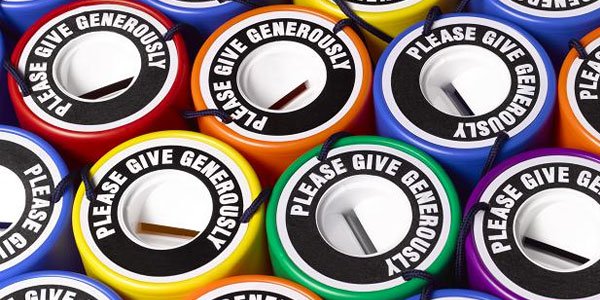Gambling for Good: How Casino Games Can Be Used for Charity
Posted: February 18, 2014
Updated: October 4, 2017

For most people, gambling is associated with money laundering, crime, cheating, addiction and of course painful, life-ruining losses. Admittedly, there’s a dark side to the habit of playing for money, but some people still managed to find a way to turn “evil” into something good: charity.
Non-profit organizations and even churches organize lotto raffles and regular bingo nights, where either all or part of the proceeds go to charitable services. Online poker sites in the UK have also been known to serve noble purposes. Last year, PokerStars raised money for cancer research and organized a series of special online poker tournaments to support the cause.
Depending on each country’s legislation, gambling companies often get tax deductions in exchange for their donations. Such laws are meant to encourage businesses to make donations, but many have learnt to use this to their advantage instead.
Investing in education
There are several countries where gambling is considered illegal, but lotteries and bingo games are allowed. Usually, this is because they are run by government agencies which prefer to have control over all profits, in order to invest the money wisely.
US lotteries are run by 47 different jurisdictions and are widely popular. The biggest part of the total revenue is usually used to fund schools or educational programs. With last year’s contributions totalizing $3.04 billion, the New York Lottery donated nearly 15% of the money to local schools.
The state of Pennsylvania has other plans for its lottery money. Here, all earnings go to programs benefitting older residents. According to the reports for the last fiscal year, the state-run company made an impressive $3.69 billion in sales. More than $1 billion went to the Lottery Fund.
Run by the Camelot Group, UK’s National Lottery spends only 4% of its revenue on operating costs. Last year, the company managed to contribute a weekly average of GBP35 million for good causes.
Charity and business
The British National Lottery’s charitable funds are allocated as follows:
• 40% for health, education, environment and charity
• 20% for arts
• 20% for sports
• 20% for heritage
But state governments are not the only ones who have taken it upon them to use players’ love for gambling for something good. There are a few companies operating charitable online casinos, bingo sites, sportsbooks and poker rooms.
BetOnCharity lets players pick their favorite organization and then donates up to 40% of the profits to it. SpinForGood is another online charity gambling site, which lets users play slots for free but also gives them the option of making a $5 or $20 tax-deductable donation. In exchange for it, they receive virtual chips, as well as the chance to join a slots tournament.
Last year, around Christmas, Untitled’s Casino Royal hosted a special event called “Gambling for Charity”, where participants were greeted with 1950’s cocktails and burlesque dancers. For every $5 donation in support of the Remix Project cultural organization, participants received $250 worth of casino chips spendable at the blackjack, craps and roulette tables.
Giving something back
The history of lottery wins has seen a couple of very moving stories, but finding someone so generous that they donate all the money for a good cause seems almost unbelievable. Well it happened last year in Canada, where a man named Tom Crist decided to give away his $40 million prize to the medical center that took care of his wife when she was suffering from cancer.
More recently, an unemployed, homeless man from Hungary won a $2.8 million prize at the National Lottery. László Andraschek promised to use the winnings to pay off his debts, buy houses for himself and his three children, and then invest the remaining money into a foundation for addicts and abused women.
It’s not just the less fortunate who become generous when an unexpected prize falls into their lap. Chinese business magnate Stanley Ho has made some significant contributions to scholarly institutions in his country. The man made the news in 2007, when he paid $330,000 for a 1.5 kilogram white truffle, at a charitable event.
Bad reputation
But even with all these positive examples, most people still don’t believe that the gambling industry will ever be able to get rid of its bad reputation. And sometimes, their suspicions are well-founded. In 2008, millionaire Leigh Windsor – who ran a lottery company – was arrested for breaking British gambling laws by stealing GBP 273,000 from two air ambulance charities.
America has a few negative examples too. The local press revealed that several companies ran million-dollar “charitable” gambling businesses, but only donated a couple of thousands of dollars from their massive earnings. Several gambling venues making claiming to run charitable poker tournaments were shut down over the past few years and lawmakers have promised to tighten regulations.
There are plenty of examples which prove that gambling can be used for good causes, such as improving the education or health system, funding cancer research or – why not? – helping people fight against gambling addiction. In the end, it is up to the authorities to make sure that no one takes advantage of the rightful benefits created for companies and organizations that really make a difference.
















